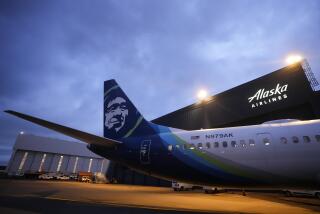Be Tough for Safety’s Sake
- Share via
With a new administration coming in, this week’s resignation of National Transportation Safety Board Chairman Jim Hall was routine. Still, it’s worthwhile to remark on what Hall brought to the board in his six-year term, and to urge George W. Bush to make sure that Hall’s aggressive pro-consumer stance does not leave with him.
Too many of the federal offices charged with helping to protect the public have conflicted mandates or simply do an unsatisfactory job. Among them are the Federal Aviation Administration, which must juggle air travel boosterism with ensuring safety; the federal Office of Pipeline Safety, and the National Highway Transportation Safety Administration. Bush’s appointment of a new leader for the National Transportation Safety Board (NTSB) should reflect the agency’s preeminent work and not drag it down to the poor performance level of the highway safety administration or the Office of Pipeline Safety.
The NTSB is a small, independent federal agency with just 430 employees, more than one-third of whom are investigators. It has a relatively tiny budget of $62.9 million, according to a spokesman, but the agency in the last eight years has carried out its work with a vigor that belies the limits of its resources.
The NTSB’s duties include investigating every civil aviation accident in the United States and some overseas air disasters. It also probes significant accidents involving railroads, highway traffic, marine craft and petroleum and natural gas pipelines. The NTSB also issues safety recommendations designed to prevent accidents.
The board has no power to impose fines or other sanctions. Its power resides in making strong recommendations and in its chairman’s use of the bully pulpit. Hall was good at that, excoriating the Office of Pipeline Safety for its poor oversight; he made the criticism after a natural gas line explosion in August claimed the lives of 12 family members on a camping trip near Carlsbad, N.M.
The NTSB’s public hearings uncovered much information in the aftermath of the crash of Alaska Airlines Flight 261 early this year, such as the failure of an airline computer system designed to alert the company about maintenance and parts problems.
Perhaps the NTSB’s finest moment was in 1999 when it declared that the 1994 crash of USAir Flight 427 near Pittsburgh was caused by a malfunction in a tail rudder that needed design changes. Boeing, which built the 737 jet, and the Federal Aviation Administration disagreed, and some members of Congress openly wondered whether the NTSB had overstepped itself. But an independent engineering firm later backed the NTSB’s call, and Boeing agreed to retrofit more than 3,000 of the jets around the world.
By some estimates, the airline industry contributed to Bush’s campaign over Al Gore’s by 3 to 1, and the president-elect is said to be considering an airline official to replace Hall. That would be a mistake. Bush should support the NTSB’s independence, not suppress it by appointing a member of an industry that it often must investigate.
More to Read
Get the L.A. Times Politics newsletter
Deeply reported insights into legislation, politics and policy from Sacramento, Washington and beyond. In your inbox twice per week.
You may occasionally receive promotional content from the Los Angeles Times.










